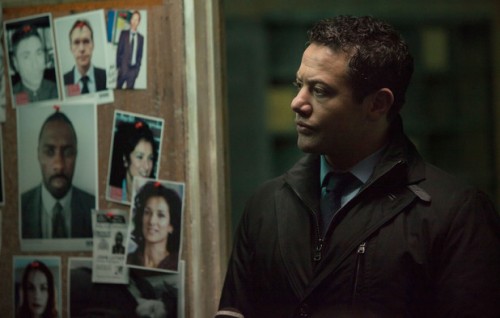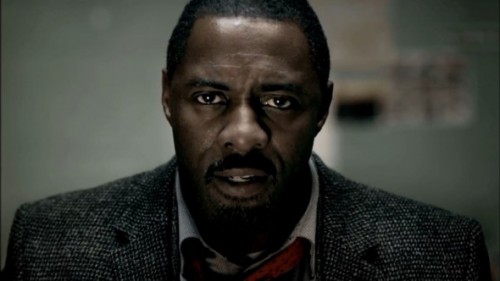
“God moves in a mysterious way
his wonders to perform;
He plants his footsteps in the sea,
and rides upon the storm.”-William Cowper, “God Moves In Mysterious Ways”
 As the hero lies down under the burden of his toil; the villain rises from underneath to do his deeds in the dark. This is the visual juxtaposition that introduces the third series of BBC’s Luther. We know what the villain looks like a la Peter Falk’s Columbo—an intentional homage to that series from writer Neil Cross—but we don’t know who he is, why he is killing people, or how John Luther will catch him.
As the hero lies down under the burden of his toil; the villain rises from underneath to do his deeds in the dark. This is the visual juxtaposition that introduces the third series of BBC’s Luther. We know what the villain looks like a la Peter Falk’s Columbo—an intentional homage to that series from writer Neil Cross—but we don’t know who he is, why he is killing people, or how John Luther will catch him.
If it sounds familiar, that’s because this is the standard beginning to every case on Luther. The first series utilized a ‘monster-of-the-week’ formula, which ended with a final episode where John Luther was falsely pegged as the ‘monster.’ In the eyes of everyone on the show–but not to the audience–he becomes the very thing they thought he was supposed to chase.
The second and third series have switched that formula up in order to give more nuance and detail to each case: four episodes each ‘season’/series, covering a total of only two cases per. The Cowper hymn above was alluded to in the final episode of series two when the section in bold was quoted by DCI Gray to describe Luther and how he goes about nabbing his killers. The suspicion she shows towards Luther in series two only increases by the beginning of series three–she has been hired on by the British equivalent of Internal Affairs and, with the help of an officer brought out of retirement (the intimidating DSU Stark), she has embarked on a mission–‘crusade’ would not be too strong a word–to reveal Luther as a crooked cop who has caused the unnecessary deaths of the innocent and criminal alike. They do this at whatever cost they deem necessary–including the possible destruction of Luther’s new romantic interest, Mary. Most of the first episode surrounds two separate storylines: the witch hunt to bring John Luther down and a case where an assumed copycat killer is murdering people and clothing them and putting masks on their faces to make them look more like who they were during one specific event in the past when the original killer first encountered them.
 As mentioned in my previous post about the suffering of John Luther, series three ramps up the concept of the good guy becoming persecuted outcast, even though he is the only one who is actually keeping the city of London safe from the very real evil out there. With the new series, Luther’s whole past is coming back to bite him, and it is all being used to ensnare him. All of the evidence Gray and Stark turn up is viewed from an assumption of guilt. The feeling the viewer has after the first episode of the new series is that no one outside of Luther himself can be trusted, that Luther may have finally met a conundrum he can’t solve. In fact, with the final words of that first episode, it appears that ‘anything goes’. We watch Luther’s devoted partner go to DCI Gray and DSU Stark and declare that he thinks Luther is dirty and that he needs to be brought down. At that moment, there is not a whole lot of hope that Luther will persevere through these trials.
As mentioned in my previous post about the suffering of John Luther, series three ramps up the concept of the good guy becoming persecuted outcast, even though he is the only one who is actually keeping the city of London safe from the very real evil out there. With the new series, Luther’s whole past is coming back to bite him, and it is all being used to ensnare him. All of the evidence Gray and Stark turn up is viewed from an assumption of guilt. The feeling the viewer has after the first episode of the new series is that no one outside of Luther himself can be trusted, that Luther may have finally met a conundrum he can’t solve. In fact, with the final words of that first episode, it appears that ‘anything goes’. We watch Luther’s devoted partner go to DCI Gray and DSU Stark and declare that he thinks Luther is dirty and that he needs to be brought down. At that moment, there is not a whole lot of hope that Luther will persevere through these trials.
This is where Neil Cross becomes one of the most thoughtful writers on TV. He has thrown enough twists and turns in the story of John Luther that the audience cannot be assured that Luther will make it out on the other side. As Cross said in an interview with BBC America, he likes strong characters who stand up in the face of darkness and evil and refuse to bow down even though they will probably not, nor really could, win in the end. The perilous situations that John Luther has put himself throughout the series could have just as easily landed in a grave as victor over the forces of evil. Even though the show is named after him, Cross has made sure that the stakes always feel very real. But evil never ceases, no matter how often Luther succeeds or how often he catches his man. And that’s the point. One person cannot do it on his own, especially when that one person is not perfectly good and sane either. It is at these crossroads that the divine whispers can be heard on the winds of the storm. Cross, again, delivers a foundational blow to the good guy/bad guy paradigm that is often prevalent in film and on TV:
“So the idea of reinvention has served me as a writer, yes, changing yourself every three years. Also, the idea of one person containing the personifications of good and evil; the duality. People are scared of the fact that monsters are in a continuum with the normal, that there’s no divide; too often we need ‘evil’ to come in from outside, rather than lifting a stone beside us. I do like to at least explore all that. People often express surprise that I’m not a psychopath. But it’s not about what I want to do to other people, it’s that I’m scared of what other people might do to me.” – The Guardian, “Neil Cross: ‘I Don’t Get On With Novelists’”

In the same article, Cross talks about the character of Luther and how he didn’t want him to be just another troubled cop who solves crimes, so he decided to make Luther “even more than troubled. On the verge of mentally ill basically…”. Idris Elba is dynamite in the way he plays off that thin semblance of sanity that runs through the unstable personality of the character. Plus, the killers, my goodness, the killers on this show are a special kind of depravity, the most frightening I’ve ever seen on the small screen. A barely sane cop battling truly depraved criminals, now that is TV.
So by the time the first episode of series three ends, we get the sense that the storm is once again building around the epicenter of John Luther. Not only does he have to face down a new and horrifically depraved villain, he also has to confront his own past and the decisions he’s made–whether clear or ambiguous in their morality–that may have led to deaths that were not just or deserved, including the death of his ex-wife. It makes sense, then, that the third, and probably final, season of the show attempts to wrap things up by placing John Luther square in the dock of the defendant as the gavel of society and his peers comes down on top of him. Once again, the question of whether or not our protagonist can survive the attacks of his allies as opposed to those of his enemies remains to be seen. But if it all doesn’t sound like a recipe for some of our favorite themes–guilt and expiation, sin and deliverance, fear and salvation, and who knows, maybe even a little grace–I don’t know what does.
Keep an eye out over the next few Monday afternoons as we do a little detective work of our own on this remarkable show.
[youtube=http://www.youtube.com/watch?v=_5yY7MOUKIs&w=600]

COMMENTS
Leave a Reply












